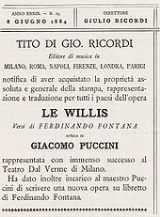
Le Villi
Encyclopedia
Le Villi is an opera
-ballet
in two acts (originally one) composed by Giacomo Puccini
to an Italian
libretto by Ferdinando Fontana
, based on the short story Les Willis by Jean-Baptiste Alphonse Karr
. Karr's story was in turn based in the Central Europe
an legend of the Willi
s, also used in the ballet Giselle
. The opera, in its original one act version, was first performed at the Teatro Dal Verme
, Milan
on 31 May 1884.
.jpg)
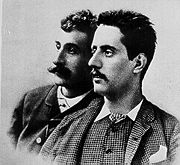 Le Villi is Puccini's first stage work. It was written for an 1883 competition of one-act operas by the publisher Sonzogno in his periodical Il teatro illustrato, but did not even earn an honourable mention. According to Mosco Carner
Le Villi is Puccini's first stage work. It was written for an 1883 competition of one-act operas by the publisher Sonzogno in his periodical Il teatro illustrato, but did not even earn an honourable mention. According to Mosco Carner
, this may have been because it was written in such haste that the score was all but illegible. His supporters, who included Arrigo Boito
, funded the first production, whose favorable reception led to publication by Giulio Ricordi
. Puccini's mother received the following telegram on the night of premiere at the Teatro dal Verme on 31 May 1884: "Theatre packed, immense success; anticipations exceeded; eighteen calls; finale of first act encored thrice"'. Ricordi urged the composer to expand the work, and Puccini did, producing a new version later that year, which was followed by modifications in 1888, and the final version in 1892.
on 26 December 1884. Le Villi was also performed at the Teatro San Carlo
in Naples
on 15 January 1888. However, on that occasion it was not viewed favourably by either the audience or the critics who characterized it as "simply an imitation of Wagner
". Puccini continued to revise the work up until 1892 when it premiered in Hamburg
conducted by Gustav Mahler
.
The UK premiere occurred on 24 September 1897 in Manchester and the US premiere of Le Villi came on 17 December 1908 at the New York Metropolitan Opera
conducted by Arturo Toscanini
. Performed as a double bill with Mascagni
's Cavalleria rusticana
, the Met's production featured Frances Alda
as Anna and Alessandro Bonci
as Roberto. The work did not receive its premiere at the Vienna State Opera
until 23 October 2005 when it was performed in a double bill with Leoš Janáček
's Osud
. Simone Young
conducted the performance with Krassimira Stoyanova as Anna and José Cura
as Roberto.
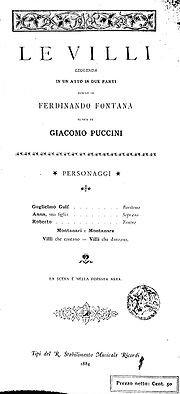 In the libretto, each part of the symphonic intermezzo between Acts I and II – L'Abbandono (The Desertion) and La tregenda (The Spectre
In the libretto, each part of the symphonic intermezzo between Acts I and II – L'Abbandono (The Desertion) and La tregenda (The Spectre
) – is preceded by explanatory verses
recounting the intervening events. Michele Girardi, citing a letter from Fontana to Puccini on 3 September 1884, has pointed out that the librettist intended for these to be read by the audience but not actually recited by a narrator. According to Mosco Carner, Puccini had intended for the verses to be read out to the audience, although he notes there is no mention of this having actually happened in contemporary reviews of the first production. Likewise, there is no record of a narrator having been used at the first performance of Le Villi at the Metropolitan opera in 1908. Nevertheless, a narrator is used in some modern productions of the opera, such as the September 2004 production at the Teatro Dal Verme with Leo Nucci as the narrator, and the August 1994 production at the Festival della Valle d'Itria
in Martina Franca
with Massimo Foschi as narrator. A narrator (Tito Gobbi
) is also used in the Sony 1981 studio recording of the work.
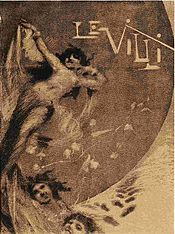
Family and guests dance at a celebration of the engagement in marriage of Roberto and Anna. Roberto must leave before the ceremony to collect an inheritance, and Anna worries that she will never see him again (Aria: "Se come voi piccina"). Roberto comforts Anna telling her that it will be fine and they will marry when he returns from Mainz. Anna tells Roberto of her dreams of him dying but Roberto tells Anna that she should not worry about his love failing and that she may doubt her God but not his love for her. The crowd returns and Anna is still worried about Roberto leaving. Roberto then asks Guglielmo, Anna’s father, to bless them before his journey and Roberto sets off for Mainz.
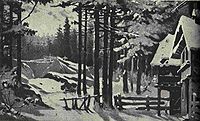 Anna's father, Guglielmo, holds Roberto responsible for Anna's death and calls upon the Villi to take vengeance on Roberto (Aria: "Anima santa della figlia mia"). The Villi call upon the ghost of Anna and lure Roberto into the forest. Roberto, now penniless and abandoned by the seductress, returns when news of Anna's Death reaches him. Hoping that he will be forgiven the Villi stalk Roberto as he mourns the loss of the days of his youth (Aria: "Torna ai felici dì
Anna's father, Guglielmo, holds Roberto responsible for Anna's death and calls upon the Villi to take vengeance on Roberto (Aria: "Anima santa della figlia mia"). The Villi call upon the ghost of Anna and lure Roberto into the forest. Roberto, now penniless and abandoned by the seductress, returns when news of Anna's Death reaches him. Hoping that he will be forgiven the Villi stalk Roberto as he mourns the loss of the days of his youth (Aria: "Torna ai felici dì
"). Roberto then finds the one last flower left alive in the winter and tries to find hope that Anna lives but is repelled by the Villi when he ties to knock on the door of Guglielmo's house. Roberto then tries to pray for forgiveness but finds he cannot because of the curse put upon him by the Villi. As Roberto curses his fate Anna appears to him and tells him of the suffering that she had to endure. Roberto begs for forgiveness and he too feels the pain of Anna burning in his heart. But Roberto is not forgiven and Anna calls upon the Villi, who curse Roberto with cries of "traitor." There, the Villi and Anna dance with Roberto until he dies of exhaustion at Anna's feet.
Opera
Opera is an art form in which singers and musicians perform a dramatic work combining text and musical score, usually in a theatrical setting. Opera incorporates many of the elements of spoken theatre, such as acting, scenery, and costumes and sometimes includes dance...
-ballet
Ballet
Ballet is a type of performance dance, that originated in the Italian Renaissance courts of the 15th century, and which was further developed in France and Russia as a concert dance form. The early portions preceded the invention of the proscenium stage and were presented in large chambers with...
in two acts (originally one) composed by Giacomo Puccini
Giacomo Puccini
Giacomo Antonio Domenico Michele Secondo Maria Puccini was an Italian composer whose operas, including La bohème, Tosca, Madama Butterfly, and Turandot, are among the most frequently performed in the standard repertoire...
to an Italian
Italian language
Italian is a Romance language spoken mainly in Europe: Italy, Switzerland, San Marino, Vatican City, by minorities in Malta, Monaco, Croatia, Slovenia, France, Libya, Eritrea, and Somalia, and by immigrant communities in the Americas and Australia...
libretto by Ferdinando Fontana
Ferdinando Fontana
Ferdinando Fontana was an Italian journalist, dramatist, and poet. He is best known today for having written the libretti of the first two operas by Giacomo Puccini – Le Villi and Edgar.-Biography:...
, based on the short story Les Willis by Jean-Baptiste Alphonse Karr
Jean-Baptiste Alphonse Karr
Jean-Baptiste Alphonse Karr was a French critic, journalist, and novelist. His brother Eugène was a talented engineer, and his aunt Carme Karr was a writer, journalist and suffragist in La Roche-Mabile....
. Karr's story was in turn based in the Central Europe
Central Europe
Central Europe or alternatively Middle Europe is a region of the European continent lying between the variously defined areas of Eastern and Western Europe...
an legend of the Willi
Slavic fairies
Fairies in Slavic mythology come in several forms and their names are spelled differently based on the specific language. Among the ones listed below there were also khovanets , dolia , polyovyk or polevoi , perelesnyk , lesovyk or leshyi , blud , mara Fairies in Slavic mythology come in several...
s, also used in the ballet Giselle
Giselle
Giselle is a ballet in two acts with a libretto by Jules-Henri Vernoy de Saint-Georges and Théophile Gautier, music by Adolphe Adam, and choreography by Jean Coralli and Jules Perrot. The librettist took his inspiration from a poem by Heinrich Heine...
. The opera, in its original one act version, was first performed at the Teatro Dal Verme
Teatro Dal Verme
The Teatro Dal Verme is a theatre in Milan, Italy located on the Via San Giovanni sul Muro, on the site of the former private theatre the Politeama Ciniselli. It was designed by Giuseppe Pestagalli to a commission from Count Francesco Dal Verme, and was used primarily for plays and opera...
, Milan
Milan
Milan is the second-largest city in Italy and the capital city of the region of Lombardy and of the province of Milan. The city proper has a population of about 1.3 million, while its urban area, roughly coinciding with its administrative province and the bordering Province of Monza and Brianza ,...
on 31 May 1884.
.jpg)

Mosco Carner
Mosco Carner was an Austrian-born British musicologist, conductor and critic. He wrote on a wide range of music subjects, but was particularly known for his studies on the life and works of the composers Giacomo Puccini and Alban Berg.-Biography:Born in Vienna to Rudolf and Selma Cohen, Carner...
, this may have been because it was written in such haste that the score was all but illegible. His supporters, who included Arrigo Boito
Arrigo Boito
Arrigo Boito , aka Enrico Giuseppe Giovanni Boito, pseudonym Tobia Gorrio, was an Italian poet, journalist, novelist and composer, best known today for his libretti, especially those for Giuseppe Verdi's operas Otello and Falstaff, and his own opera Mefistofele...
, funded the first production, whose favorable reception led to publication by Giulio Ricordi
Giulio Ricordi
Giulio Ricordi was an Italian editor and musician.-Biography:Ricordi was born in Milan, where he also died....
. Puccini's mother received the following telegram on the night of premiere at the Teatro dal Verme on 31 May 1884: "Theatre packed, immense success; anticipations exceeded; eighteen calls; finale of first act encored thrice"'. Ricordi urged the composer to expand the work, and Puccini did, producing a new version later that year, which was followed by modifications in 1888, and the final version in 1892.
Performance history
A revised, two act version was performed in at the Teatro Regio, TurinTurin
Turin is a city and major business and cultural centre in northern Italy, capital of the Piedmont region, located mainly on the left bank of the Po River and surrounded by the Alpine arch. The population of the city proper is 909,193 while the population of the urban area is estimated by Eurostat...
on 26 December 1884. Le Villi was also performed at the Teatro San Carlo
Teatro di San Carlo
The Real Teatro di San Carlo is an opera house in Naples, Italy. It is the oldest continuously active such venue in Europe.Founded by the Bourbon Charles VII of Naples of the Spanish branch of the dynasty, the theatre was inaugurated on 4 November 1737 — the king's name day — with a performance...
in Naples
Naples
Naples is a city in Southern Italy, situated on the country's west coast by the Gulf of Naples. Lying between two notable volcanic regions, Mount Vesuvius and the Phlegraean Fields, it is the capital of the region of Campania and of the province of Naples...
on 15 January 1888. However, on that occasion it was not viewed favourably by either the audience or the critics who characterized it as "simply an imitation of Wagner
Richard Wagner
Wilhelm Richard Wagner was a German composer, conductor, theatre director, philosopher, music theorist, poet, essayist and writer primarily known for his operas...
". Puccini continued to revise the work up until 1892 when it premiered in Hamburg
Hamburg
-History:The first historic name for the city was, according to Claudius Ptolemy's reports, Treva.But the city takes its modern name, Hamburg, from the first permanent building on the site, a castle whose construction was ordered by the Emperor Charlemagne in AD 808...
conducted by Gustav Mahler
Gustav Mahler
Gustav Mahler was a late-Romantic Austrian composer and one of the leading conductors of his generation. He was born in the village of Kalischt, Bohemia, in what was then Austria-Hungary, now Kaliště in the Czech Republic...
.
The UK premiere occurred on 24 September 1897 in Manchester and the US premiere of Le Villi came on 17 December 1908 at the New York Metropolitan Opera
Metropolitan Opera
The Metropolitan Opera is an opera company, located in New York City. Originally founded in 1880, the company gave its first performance on October 22, 1883. The company is operated by the non-profit Metropolitan Opera Association, with Peter Gelb as general manager...
conducted by Arturo Toscanini
Arturo Toscanini
Arturo Toscanini was an Italian conductor. One of the most acclaimed musicians of the late 19th and 20th century, he was renowned for his intensity, his perfectionism, his ear for orchestral detail and sonority, and his photographic memory...
. Performed as a double bill with Mascagni
Pietro Mascagni
Pietro Antonio Stefano Mascagni was an Italian composer most noted for his operas. His 1890 masterpiece Cavalleria rusticana caused one of the greatest sensations in opera history and single-handedly ushered in the Verismo movement in Italian dramatic music...
's Cavalleria rusticana
Cavalleria rusticana
Cavalleria rusticana is an opera in one act by Pietro Mascagni to an Italian libretto by Giovanni Targioni-Tozzetti and Guido Menasci, adapted from a play written by Giovanni Verga based on his short story. Considered one of the classic verismo operas, it premiered on May 17, 1890 at the Teatro...
, the Met's production featured Frances Alda
Frances Alda
Frances Alda was a New Zealand-born, Australian-raised operatic soprano. She achieved fame during the first three decades of the 20th century due to her outstanding singing voice, fine technique and colourful personality—and frequent onstage partnerships at the New York Metropolitan Opera with the...
as Anna and Alessandro Bonci
Alessandro Bonci
Alessandro Bonci was an Italian lyric tenor known internationally for his association with the bel canto repertoire. He sang at many famous theatres, including New York's Metropolitan Opera, Milan's La Scala and London's Royal Opera House, Covent Garden.-Career:A native of Cesena, Romagna, Bonci...
as Roberto. The work did not receive its premiere at the Vienna State Opera
Vienna State Opera
The Vienna State Opera is an opera house – and opera company – with a history dating back to the mid-19th century. It is located in the centre of Vienna, Austria. It was originally called the Vienna Court Opera . In 1920, with the replacement of the Habsburg Monarchy by the First Austrian...
until 23 October 2005 when it was performed in a double bill with Leoš Janáček
Leoš Janácek
Leoš Janáček was a Czech composer, musical theorist, folklorist, publicist and teacher. He was inspired by Moravian and all Slavic folk music to create an original, modern musical style. Until 1895 he devoted himself mainly to folkloristic research and his early musical output was influenced by...
's Osud
Destiny (Janácek)
Destiny is an opera in three acts by Leoš Janáček to a Czech libretto by the composer and Fedora Bartošová. Janáček began the work in 1903 and completed it in 1907. The inspiration for the opera came from a visit by Janáček in the summer of 1903, after the death of his daughter Olga, to the spa...
. Simone Young
Simone Young
Simone Margaret Young AM is an Australian conductor. She is music director of the Hamburg Philharmonic and general manager of the Hamburg State Opera...
conducted the performance with Krassimira Stoyanova as Anna and José Cura
José Cura
José Cura is a prominent operatic tenor known for his intense and original interpretations of his characters, notably Verdi’s Otello and Saint-Saëns’ Samson, as well as for his unconventional and innovative concert performances. He is also able to perform high baritone roles with the extended...
as Roberto.
Roles

SPECTRE
SPECTRE is a fictional global terrorist organisation featured in the James Bond novels by Ian Fleming, the films based on those novels, and James Bond video games...
) – is preceded by explanatory verses
Verse (poetry)
A verse is formally a single line in a metrical composition, e.g. poetry. However, the word has come to represent any division or grouping of words in such a composition, which traditionally had been referred to as a stanza....
recounting the intervening events. Michele Girardi, citing a letter from Fontana to Puccini on 3 September 1884, has pointed out that the librettist intended for these to be read by the audience but not actually recited by a narrator. According to Mosco Carner, Puccini had intended for the verses to be read out to the audience, although he notes there is no mention of this having actually happened in contemporary reviews of the first production. Likewise, there is no record of a narrator having been used at the first performance of Le Villi at the Metropolitan opera in 1908. Nevertheless, a narrator is used in some modern productions of the opera, such as the September 2004 production at the Teatro Dal Verme with Leo Nucci as the narrator, and the August 1994 production at the Festival della Valle d'Itria
Festival della Valle d'Itria
The Festival della Valle d’Itria is a summer opera festival held in the south eastern Italian town of Martina Franca in the Apulia region. The Festival was founded in 1975 and performances are given in July and August each summer on a specially constructed stage in the outdoor courtyard of the...
in Martina Franca
Martina Franca
Martina Franca is a town and comune in the province of Taranto, Apulia , Italy. It is the second most populated city of the province after Taranto....
with Massimo Foschi as narrator. A narrator (Tito Gobbi
Tito Gobbi
Tito Gobbi was an Italian operatic baritone with an international reputation.-Biography:Tito Gobbi was born in Bassano del Grappa and studied law at the University of Padua before he trained as a singer. Giulio Crimi, a well-known Italian tenor of a previous generation, was Gobbi's teacher in Rome...
) is also used in the Sony 1981 studio recording of the work.
| Role | Voice type | Premiere Cast, 31 May 1884 (Conductor:) |
Premiere Cast, revised version, 26 December 1884 (Conductor: Giovanni Bolzoni) |
|---|---|---|---|
| Guglielmo, the head forester | baritone Baritone Baritone is a type of male singing voice that lies between the bass and tenor voices. It is the most common male voice. Originally from the Greek , meaning deep sounding, music for this voice is typically written in the range from the second F below middle C to the F above middle C Baritone (or... or bass |
Erminio Peltz | Agostino Gnaccarini |
| Anna, his daughter | soprano Soprano A soprano is a voice type with a vocal range from approximately middle C to "high A" in choral music, or to "soprano C" or higher in operatic music. In four-part chorale style harmony, the soprano takes the highest part, which usually encompasses the melody... |
Rosina Caponetti | Elena Boronat |
| Roberto, a young man | tenor Tenor The tenor is a type of male singing voice and is the highest male voice within the modal register. The typical tenor voice lies between C3, the C one octave below middle C, to the A above middle C in choral music, and up to high C in solo work. The low extreme for tenors is roughly B2... |
Antonio d'Andrade | Enrico Filippi-Bresciani |
| Mountain folk, fairies, unseen spirits | |||
Synopsis

- Place: The Black Forest
- Time: The Middle Ages
Act 1
SpringFamily and guests dance at a celebration of the engagement in marriage of Roberto and Anna. Roberto must leave before the ceremony to collect an inheritance, and Anna worries that she will never see him again (Aria: "Se come voi piccina"). Roberto comforts Anna telling her that it will be fine and they will marry when he returns from Mainz. Anna tells Roberto of her dreams of him dying but Roberto tells Anna that she should not worry about his love failing and that she may doubt her God but not his love for her. The crowd returns and Anna is still worried about Roberto leaving. Roberto then asks Guglielmo, Anna’s father, to bless them before his journey and Roberto sets off for Mainz.
Intermezzo
Roberto is enchanted by a seductress, and forgets Anna. Anna waits through the summer and the autumn and in the winter dies in his absence. The legend of the fairies (Le Villi) is then explained. When a woman dies of a broken heart, the fairies force the heart breaker to dance until death.Act 2
Winter
Torna ai felici dì
"Torna ai felici dì" is an aria from Act 2 of the 1884 opera, Le Villi by Giacomo Puccini. It is sung by Roberto...
"). Roberto then finds the one last flower left alive in the winter and tries to find hope that Anna lives but is repelled by the Villi when he ties to knock on the door of Guglielmo's house. Roberto then tries to pray for forgiveness but finds he cannot because of the curse put upon him by the Villi. As Roberto curses his fate Anna appears to him and tells him of the suffering that she had to endure. Roberto begs for forgiveness and he too feels the pain of Anna burning in his heart. But Roberto is not forgiven and Anna calls upon the Villi, who curse Roberto with cries of "traitor." There, the Villi and Anna dance with Roberto until he dies of exhaustion at Anna's feet.
Recordings
| Year | Cast (Roberto, Anna, Guglielmo) |
Conductor, Opera House and Orchestra |
Label |
|---|---|---|---|
| 1954 | Gianni Dal Ferro, Elisabetta Fusco, Silvano Verlinghieri |
Arturo Basile Arturo Basile Arturo Basile was an Italian conductor. He was known mostly for his work in the Italian operatic repertoire, especially Puccini and Verdi.... , RAI Turin Chorus and Orchestra |
Audio CD: Cetra Records (Warner Fonit Cetra) |
| 1971 | Barry Morell Barry Morell Barry Morell was an American operatic tenor particularly associated with the Italian and French repertoire.He was born in New York City and studied at the Juilliard School with Giuseppe Danise... , Adriana Maliponte Adriana Maliponte Adriana Maliponte is an Italian operatic soprano.Born Adriana Macchiaioli, she moved with her family to France a the age of 14. She studied first at the Mulhouse Conservatory and later in Como with Carmen Melis and made her stage debut at the Teatro Nuovo in Milan in 1958... , Matteo Manuguerra Matteo Manuguerra Matteo Manuguerra was a Tunisian-born French baritone, one of the leading Verdi baritones of the 1970s.Manuguerra was born in Tunis, Tunisia, to Italian parents, who later moved to Argentina. He came late to music, starting his vocal study at the age of 35, at the Buenos Aires Music Conservatory,... |
Anton Guadagno Anton Guadagno Anton Guadagno was an Italian operatic conductor.Born in Castellammare del Golfo, Italy, Anton Guadagno studied at the Vincenzo Bellini Conservatory in Palermo and the Accademia di Santa Cecilia in Rome. He worked with Herbert von Karajan while studying at the Salzburg Mozarteum, and won first... , Vienna Volksoper Vienna Volksoper The Vienna Volksoper is a major opera house in Vienna, Austria. It gives about three hundred performances of twenty-five productions during an annual season running from September through June.... Orchestra, Vienna Academy Chamber Choir |
Audio LP: RCA Records RCA Records RCA Records is one of the flagship labels of Sony Music Entertainment. The RCA initials stand for Radio Corporation of America , which was the parent corporation from 1929 to 1985 and a partner from 1985 to 1986.RCA's Canadian unit is Sony's oldest label... Cat: LSC 7096 |
| 1979 | David Parker, Marilyn Richardson, James Christiansen |
Myer Fredman Myer Fredman Myer Fredman is a British-Australian conductor.He studied at Dartington Hall and in London with Peter Gellhorn, Vilém Tauský, Sir Adrian Boult, and was assistant conductor to Otto Klemperer, Vittorio Gui, Sir John Pritchard and Sir Charles Mackerras.He was conductor at the Glyndebourne Festival... , Adelaide Symphony Orchestra Adelaide Symphony Orchestra The Adelaide Symphony Orchestra was founded as a 17 player radio ensemble in 1936, in Adelaide, South Australia. The orchestra reformed in 1949 as the 55 member South Australian Symphony Orchestra. It reverted to its original and present title, the Adelaide Symphony Orchestra, in late 1974, and... , Adelaide Festival Chorale |
Audio CD: Chandos Cat: ABT 1019 |
| 1979 | Plácido Domingo Plácido Domingo Plácido Domingo KBE , born José Plácido Domingo Embil, is a Spanish tenor and conductor known for his versatile and strong voice, possessing a ringing and dramatic tone throughout its range... , Renata Scotto Renata Scotto Renata Scotto is an Italian soprano and opera director.Recognized for her sense of style, musicality and as a remarkable singer-actress, Scotto is considered one of the preeminent singers of her generation, specializing in the bel canto repertoire with excursions into the verismo and Verdi... , Leo Nucci Leo Nucci Leo Nucci is an Italian operatic baritone, particularly suited to Verdi roles.Born at Castiglione dei Pepoli, near Bologna, he studied with Giuseppe Marchese and made his stage debut in Spoleto, as Figaro in Il barbiere di Siviglia, in 1967, he then joined the chorus of La Scala in Milan, and... Narrator: Tito Gobbi Tito Gobbi Tito Gobbi was an Italian operatic baritone with an international reputation.-Biography:Tito Gobbi was born in Bassano del Grappa and studied law at the University of Padua before he trained as a singer. Giulio Crimi, a well-known Italian tenor of a previous generation, was Gobbi's teacher in Rome... |
Lorin Maazel Lorin Maazel Lorin Varencove Maazel is an American conductor, violinist and composer.- Early life :Maazel was born to Jewish-American parents in Neuilly-sur-Seine in France and brought up in the United States, primarily at his parents' home in Pittsburgh's Oakland neighborhood. His father, Lincoln Maazel , was... , National Philharmonic Orchestra, Ambrosian Opera Chorus |
Audio CD: Sony Classical Cat: MT 76890 |
| 2004 | Albert Montserrat, Andrea Rola, Halla Margret |
Tamás Pál, Orchestra and Chorus Filarmonica Mediterranea, (Video recording of a performance in the Grandi Terme di Villa Adriana, Roma as part of the Festival Euro Mediterraneo, 31 July) |
DVD: Encore Cat: DVD 2201 |
External links
- Synopsis from Naxos RecordsNaxos RecordsNaxos Records is a record label specializing in classical music. Through a number of imprints, Naxos also releases genres including Chinese music, jazz, world music, and early rock & roll. The company was founded in 1987 by Klaus Heymann, a German-born resident of Hong Kong.Naxos is the largest...
- Libretto in English translation on impresario.ch
- Libretto in Italian (with stage directions in English) on opera.stanford.edu

